 |
Climate change and pollution often have joint sources and exert combined and mutually reinforcing pressures on the environment and human health.
Side event: Decarbonization and Detoxification: Opportunities for Integrated Actions
 29 February 2024
17:15 – 18:30 p.m. (UTC+3)
Helipad, MEAs events space, Tent C
Nairobi, Kenya
Watch the event recording here
Climate change and pollution often have joint sources and exert combined and mutually reinforcing pressures on the environment and human health.
The sound management of wastes and chemicals, and circular economy approaches, have a critical role to play in addressing climate change. Curbing chemical and wastes pollution offers various co-benefits to tackling climate change, either directly, through sound solid waste management or, indirectly, through the effects of waste prevention, re-use, recycling and resource recovery across economic sectors and through more circular and sustainable products. Circularity approaches could cut global GHG emissions by up to 20% while creating green jobs and improving public health.
By bringing experts from different horizons, the side event will discuss the co-benefits offered by integrated approaches aimed at addressing GHG emissions and releases from pollutants, while preventing trade-offs.
Key areas where synergistic actions can be initiated and which will be showcased at the side event are: policy, through the synergistic implementation of relevant multilateral environmental agreements (MEAs), innovation and technology, financing and awareness and education.
Event moderated by:
- Dr. Donald Cooper, Director, Transparency Division, United Nations Framework Convention on Climate Change (UNFCCC)
Opening:
- Ms. Sheila Aggarwal-Khan, Director, Industry and Economy Division, United Nations Environment
- Dr. Rolph Payet, Executive Secretary, Basel, Rotterdam and Stockholm Conventions
Keynote speech:
- Ms. Chizuru Aoki, Lead Environmental Specialist, on behalf of Mr. Carlos Manuel Rodriguez, CEO and Chairperson, Global Environment Facility (GEF)
Panel discussion:
- Ms. Astrid Schomaker, Director for Green Diplomacy and Multilateralism, Directorate General for Environment, European Commission
- Ms. Beatrice Cyiza, Director General of Biodiversity and Climate, Ministry of Environment, Rwanda
- Mr. Carlos Silva Filho, President, International Solid Waste Association (ISWA)
- Mr. Marcos Orellana, UN Special Rapporteur on Toxics and Human Rights
- Mr. Björn Beeler, International Coordinator, International Pollutants Elimination Network (IPEN)
Q&A
Closing remarks:
- Ms. Maya Berci, President of the 12th meeting of the Conference of the Parties to the Stockholm Convention, Executive Director, Chemicals Management Division, Environment and Climate Change Canada
Resources
|
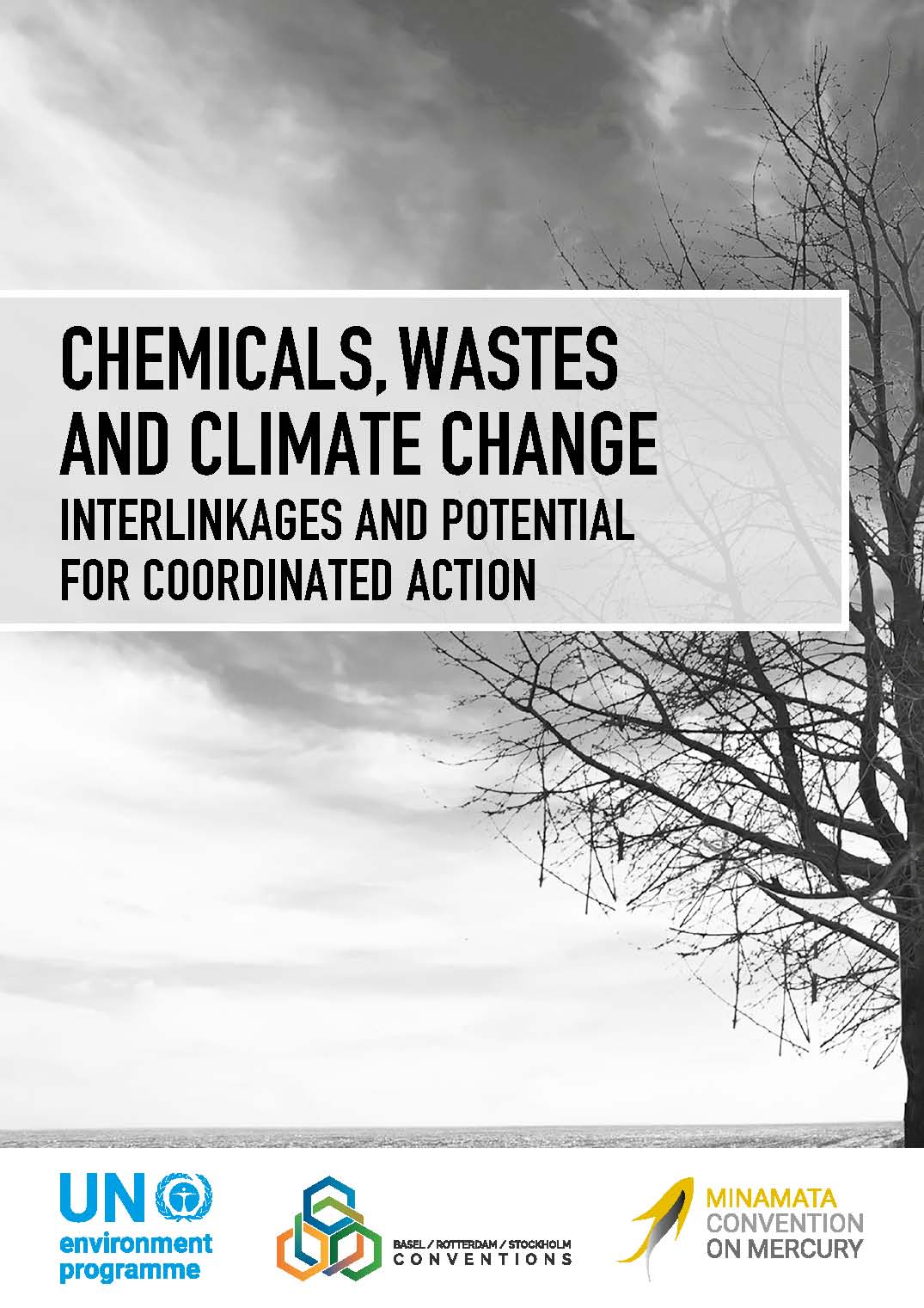
|
Report
Chemicals, Wastes and Climate Change – Interlinkages and potential for coordinated action
Download (PDF) English
|
|
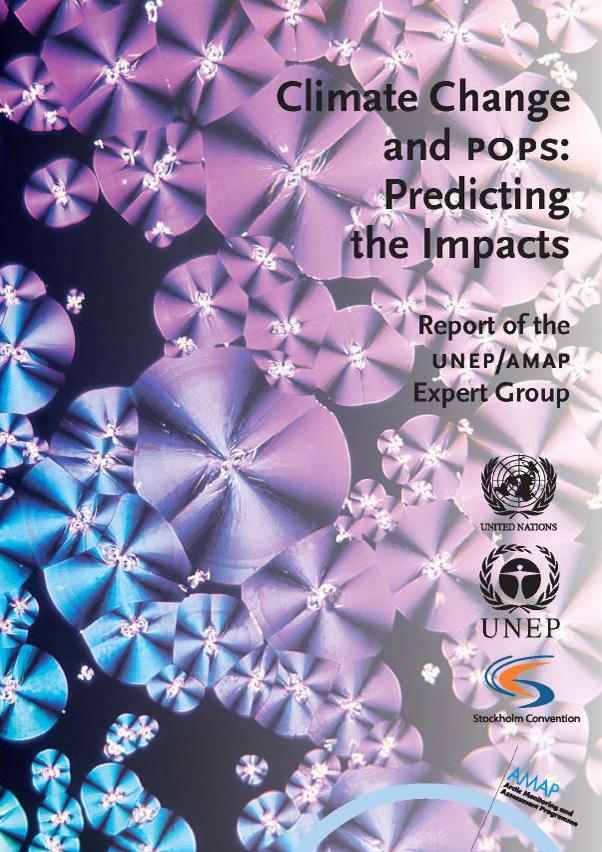
|
Report
Climate and POPs: Predicting the Impacts
Download (PDF) English
|
Photo gallery

Organizers
|
|

|
|
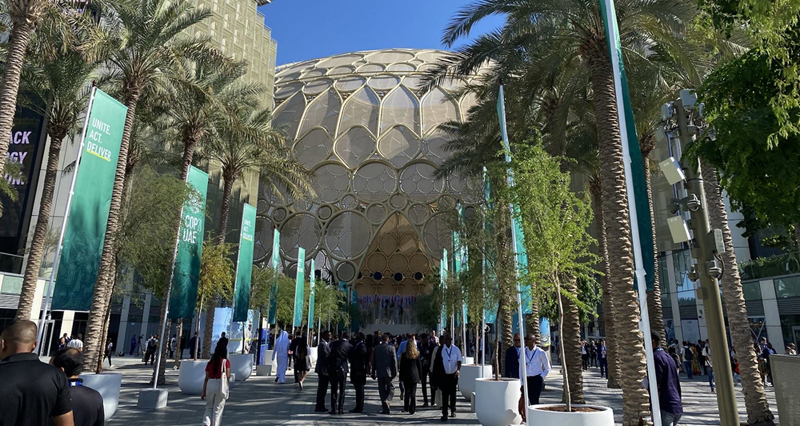 |
The BRS Secretariat engaged in COP28 in various events and shares its takeaways from the meeting on the contribution of the sound management of chemicals and wastes to climate action.
BRS at COP-28: How the sound management of chemicals and waste relates to climate action
 COP28 concluded with a Landmark decision on the outcome of the first Global Stocktake under the Paris Agreement recognizing the “need for deep, rapid and sustained reductions in GHG emissions in line with the 1.5 °C pathways” and called on Parties to contribute to global efforts in eight specific areas, including to triple renewable energy targets, double energy efficiency goals, and to transition away from fossil fuels in energy systems. Other important outcomes relate, among other things, to establishing a Global Goal on Adaptation framework, and operationalizing the loss and damage fund. The COP28 messages set the expectations for the next round of nationally determined contributions.
The BRS Secretariat engaged in COP28 in various events and shares its takeaways from the meeting on the contribution of the sound management of chemicals and wastes to climate action.
- Waste management and the circular economy has a critical role in addressing climate change;
- Solid waste management and zero-waste initiatives allows for effective GHG emissions reductions, noting that waste is the largest anthropogenic source of methane (around 20% of global methane emissions), which is projected to growth significantly in the coming years;
- Global responsible trade of waste, in particular plastic wastes, promoted by international regulations, such as the Basel Convention, protects vulnerable countries from unwanted wastes that they would not be able to manage otherwise, and hence prevent GHG emissions from occurring;
- Circular approaches promoting waste prevention, re-use, recycling, and replacement of fossil fuels and feedstock by secondary raw materials will create significant GHG emissions reductions estimated to the magnitude of 20% reductions of global emissions;
- Some countries use their nationally determined contribution as a vehicle for addressing waste management at the national level and unlocking investment, through carbon finance, which allows the private sector to continue to innovate and improve their operations;
- Waste should be seen as a resource bringing environmental benefits (less waste to be disposed of resulting in fewer GHG emissions and pollution), economic opportunities (creation of green jobs and cost savings in value chains) and resource conservation (less demand for raw material extraction).
- The transition to a circular economy requires collaboration between businesses across the value chains, with suppliers and consumers. Governments at different levels have an important role to play to create the enabling conditions for a circular transition by promoting goals and targets, facilitate collaboration among sectors, development regulations, mobilizing financial resources.
- It is crucial for countries to increase their ambition in their next round of NDC to reach Paris Agreement’s goals and, for that, waste and resource management and circularity provide effective mitigation solutions. Tools exist to assist countries to further implement waste management, for instance through the implementation of the Basel, Rotterdam and Stockholm Conventions, the Waste Wise Cities Tool developed by UN-HABITAT and the Toolbox to integrate circularity into NDCs, developed by the One Planet Network.
- It is important to recognize the interlinkages between the triple planetary crisis of climate change, biodiversity loss and pollution and to work towards coordinated solutions. Further studies should be conducted on those linkages and co-benefits as well as outreach activities should be amplified.
The BRS Secretariat wishes to thank all partners which joined the various events being held to share their views and perspectives on how the sound management of chemicals and wastes provide effective solutions for climate action.
|
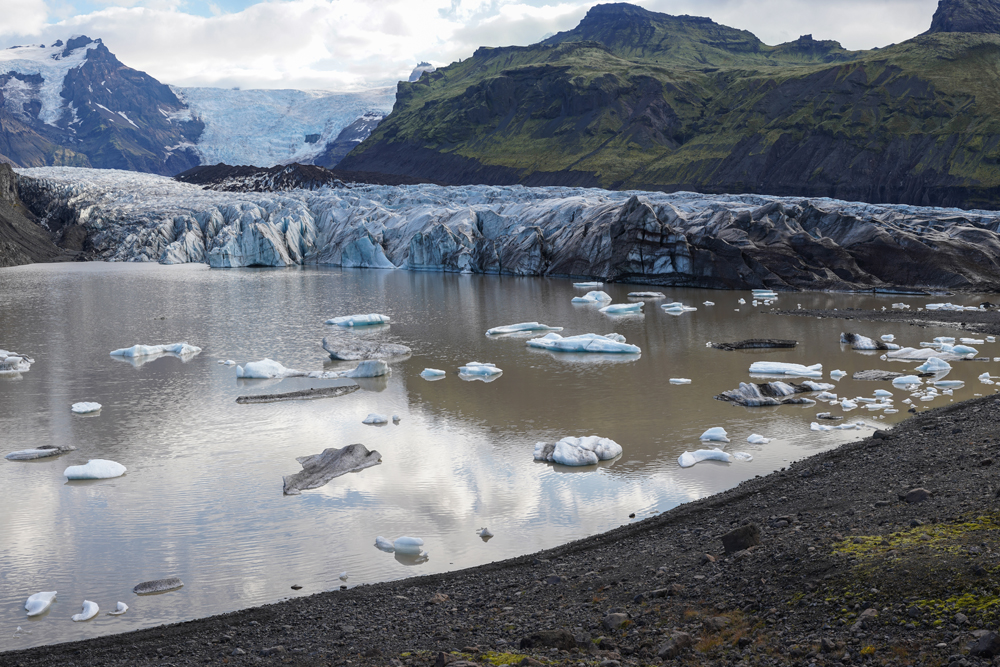 |
BRS Secretariat engagement at the upcoming Climate Change COP28 to highlight the benefits of integrating the management of chemicals and waste and, circularity economy approaches, into climate actions.
BRS Secretariat at the Climate Change COP28

The 28th meeting of the Conference of the Parties (COP28) of the UN Framework Convention on Climate Change (UNFCCC) will convene from 30 November to 12 December 2023 in Dubai, United Arab Emirates.
COP28 will be a milestone moment for international climate action. It will undertake the first global stocktake (GST) which will assess progress towards meeting the Paris Agreement’s goals, including to limit global warming to well below 2°C, ideally 1.5°C. This will help align the efforts on climate action, including measures that need to be put in place to bridge the gaps to reach the Paris Agreement’s goals. As such, it is intended to inform the next round of national climate action plans - known as the “nationally determined contributions (NDCs)” - to be put forward by 2025. COP-28 website.
The Basel, Rotterdam and Stockholm conventions share the common objective of protecting human health and the environment from hazardous chemicals and wastes. However, their scope extends far beyond pollution. As recognized by the BRS COPs at their 2023 meetings, actions taken under the conventions may contribute to achieving the UNFCCC’s objectives. Scientific evidence of the interlinkages between chemicals, waste and climate change calls for a holistic approach in addressing the intertwined climate and pollution crises. Integrated actions have the potential to bring co-benefits for reducing emissions of greenhouse gases and releases of pollutants.
The Secretariat of the Basel, Rotterdam and Stockholm Conventions will actively engage at COP 28 to bring attention to the linkages between chemicals, wastes and climate change and potentials for integrated actions.
BRS Secretariat’s engagement programme at COP28
All event times are in Gulf Standard Time (GST - GMT+4).
|
 |
A cleaner ocean is essential to island communities’ well-being, biodiversity, and livelihoods but reducing plastic waste can also play a fundamental role in mitigating climate change. This event will discuss climate mitigation and adaptation contributions provided by the environmentally sound ...
Side Event: A Quest for a More Resilient and Sustainable Future: an urgent need for climate action and healthy oceans in Seychelles
 3 December 2023
11:00-1:00 p.m.
Seychelles Pavilion
Dubai, United Arab Emirates
Online access: to be confirmed
A cleaner ocean is essential to island communities’ well-being, biodiversity, and livelihoods but reducing plastic waste can also play a fundamental role in mitigating climate change.
This event will discuss climate mitigation and adaptation contributions provided by the environmentally sound management of harmful chemicals and waste. More specifically, it will focus on actions taken at the national level by the Seychelles and other Small Island Developing countries (SIDs), as well as measures taken at the international and regional levels, under relevant multilateral environmental agreements and intergovernmental organizations.
The issues of the growing built-up chemicals in the environment that contain harmful chemicals, plastic materials production and plastic wastes generation, their management and disposal will be particularly highlighted, noting that marine plastic pollution magnifies climate impacts. Finally, outcomes of the research on climate change scenarios and projections specifically in the case of Seychelles will give us an understanding of the urgency of acting now.
Programme 
Moderator:
- Mr. Rolph Payet, the Executive Secretary of the Basel, Rotterdam and Stockholm conventions
Keynote address:
- H.E. Flavien P Joubert, Minister of Agriculture, Climate Change and Environment, Seychelles.
Panelists:
- Ms. Leticia Carvalho, Head of Marine and Freshwater Branch, Ecosystems Division and the SIDS Focal Point, United Nations Environment Programme (UNEP)
- Ms. Preethi Sushil Nair, Programme Coordinator, the United Nations Development Programme (UNDP) Mauritius and Seychelles
- Mr. Joao Sousa, Senior Programme Manager, International Union for Conservation of Nature (IUCN)
- Ms. Sheena Talma, Marine Biologist/deep-sea Ecologist, Seychelles
Photo gallery

|
 |
Efforts in waste prevention, reuse, recycling, and energy recovery can accelerate GHG reduction and sustainable trade is a powerful mechanism to reshape the situation on the ground regarding the use of plastics.
Side Event: How sustainable trade and waste management can support climate mitigation through addressing plastic pollution?
 8 December 2023
10:30-11:30 a.m.
Trade House Pavilion
Dubai, United Arab Emirates
Webcast
Efforts in waste prevention, reuse, recycling, and energy recovery can accelerate GHG reduction and sustainable trade is a powerful mechanism to reshape the situation on the ground regarding the use of plastics.
Novel designs of plastic products, non-plastic material substitutes and packageless distribution methods can have a lower environmental footprint, carbon impact and offer income generation, job creation and sustainable livelihoods.
By bringing together experts from diverse horizons, the side event will showcase the importance of responsible trade in plastics, and the environmentally sound management of plastic waste, which would also tackle climate change, promote healthy oceans and protect biodiversity.
Programme 
Moderator:
- Mr. Rolph Payet, Executive Secretary, the Secretariat of the Basel, Rotterdam, and Stockholm Conventions
Panelists:
- Mr. Aaron Chigona, Director General of Environmental Management Agency, Zimbabwe
- Ms. Stéphanie Bouziges-Eschmann, Secretary General, Fonds Français pour l’ Environnement Mondial (FFEM)
- Dr. Didacus Jules, Director General, Organization of Eastern Caribbean States (OECS)
- Mr. Anis Nassar, Lead, Circular Economy Innovation, World Economic Forum (WTO)
Comments by:
- Mr. Hoe Lim, Director, Trade and Environment Division, WTO Secretariat
- Ms. Chantal Line Carpentier, Head Trade, Environment, Climate Change and Sustainable Development, UNCTAD
|
 |
Marine plastic pollution is a global environmental threat. In the Pacific region, which is hard-hit by climate related disasters, marine plastic pollution magnifies climate impacts. Plastic pollution causes environmental disruption: pollution of soil and water systems, emission of methane gas from l...
Side Event: Connecting climate mitigation to depolluting oceans through concrete solutions in the Pacific Islands
 4 December 2023
9:00-9:50 a.m.
Moana Blue Pacific Pavilion No 29
Dubai, United Arab Emirates
Webcast
Marine plastic pollution is a global environmental threat. In the Pacific region, which is hard-hit by climate related disasters, marine plastic pollution magnifies climate impacts. Plastic pollution causes environmental disruption: pollution of soil and water systems, emission of methane gas from landfills, thinning of ozone layer, negative impact on marine environments.
There are exciting initiatives in Pacific Islands to reduce marine pollution, such as the SPREP Moana Taka Partnership providing a regional opportunity to export hazardous wastes for environmentally sound management and disposal elsewhere. This event will explore these different initiatives in place to tackle plastic pollution and mitigate climate change.
Programme 
Moderator:
- Dr. Carolyn Deere Birkbeck, Director of the Forum on Trade, Environment, and the SDGs (TESS)
Keynote address:
-
Hon Prime Minister Mark Brown, the Cook Islands (tbc)
Panelists:
- Mr. Rolph Payet, the Executive Secretary of the Basel, Rotterdam and Stockholm conventions
- Mr. Sefanaia Nawadra, Director-General, Secretariat of the Pacific Regional Environment Programme (SPREP)
- Ms. Leticia Carvalho, Head of Marine and Freshwater Branch, Ecosystems Division and the SIDS Focal Point, United Nations Environment Programme (UNEP)
- Ms. Ellysar Baroudy, Lead natural resources specialist, World Bank Organisation (WBO)
- Ms. Jewel Batchasingh, Director, the Basel Convention Regional Centre for Training and Technology Transfer for the Caribbean
- Mr. Joao Sousa, Senior Programme Manager, International Union for Conservation of Nature (IUCN)
Resources
| Presentation |
|
Webcast recording
|
|
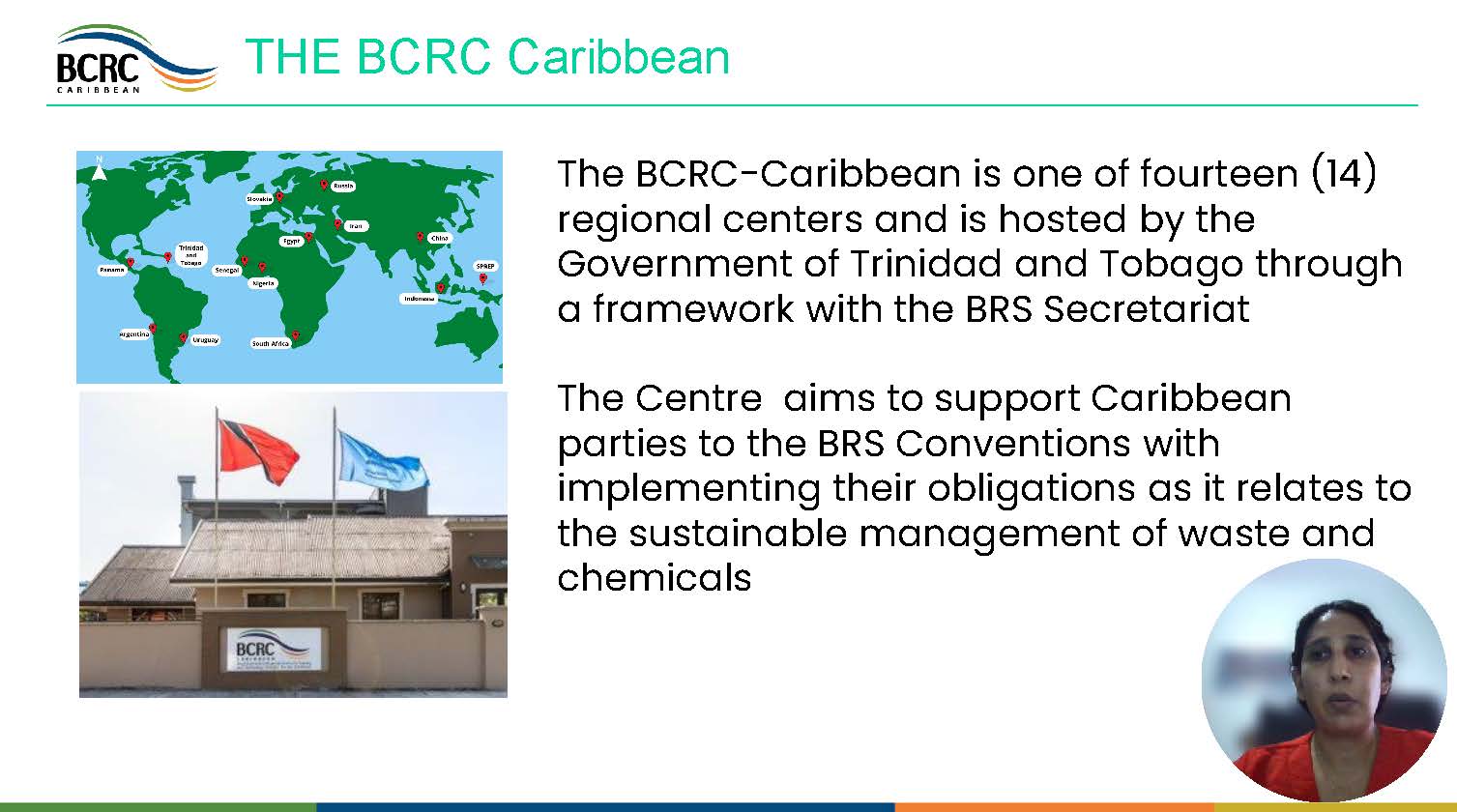 |
|
|
|
Photo gallery

|
 |
Environmentally sound management of waste, and its responsible trade, is essential in mitigating climate change and promoting a circular economy. The waste management sector can play a vital role in climate mitigation through a multitude of actions.
Side Event: Accelerating integration of low-carbon waste management in Nationally Determined Contributions to Reach Climate Commitments
 3 December 2023
16:00–16:45 p.m.
Finland Pavilion
Dubai, United Arab Emirates
webcast recording
Environmentally sound management of waste, and its responsible trade, is essential in mitigating climate change and promoting a circular economy. The waste management sector can play a vital role in climate mitigation through a multitude of actions. First, through direct greenhouse gas emissions reductions from solid waste management and, second, indirectly through the effects of waste prevention, re-use, recycling, and replacement of fossil fuels and feedstock by secondary raw materials. Waste recycling and resource recovery - which are at the core of a circular economy - offer potential GHG reductions in the magnitude of up to 20% of the global emissions.
By bringing together experts from different horizons, the side event will foster the sharing of experiences and solutions to support countries to consider integrating waste management policies and circular economy interventions in their nationally determined contributions (NDC).
Programme 
Moderator:
- Ms. Kerstin Stendahl, Special Envoy for Climate Change, Ministry for Foreign Affairs, Finland
Panelists:
-
Maimunah Mohd Sharif, Under-Secretary-General and Executive Director, United Nations Human Settlements Programme (UN-HABITAT)
- Daniel Tutu Benefoh, Climate Change Unit Director, Environmental Protection Agency, Ghana
- Peter Simões, Chair, Working Group on Climate Change, International Solid Waste Association (ISWA)
- Jorge Laguna Celis, Director, One Planet Network, United Nations Environment Programme (UNEP)
- Rolph Payet, Executive Secretary, Basel, Rotterdam and Stockholm Conventions
Resources
Building Circularity into Nationally Determined Contributions (NDCs) – A Practical Toolbox co-developed by UNDP, UNEP/One Planet Network Secretariat, and UNFCCC secretariat .
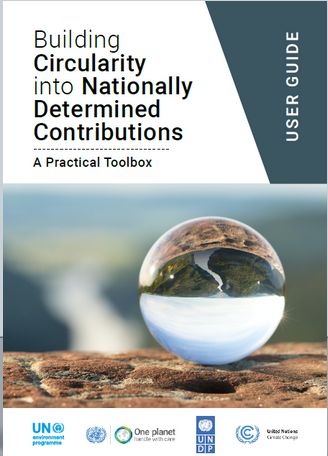 |
|
|
|
Photo gallery

|
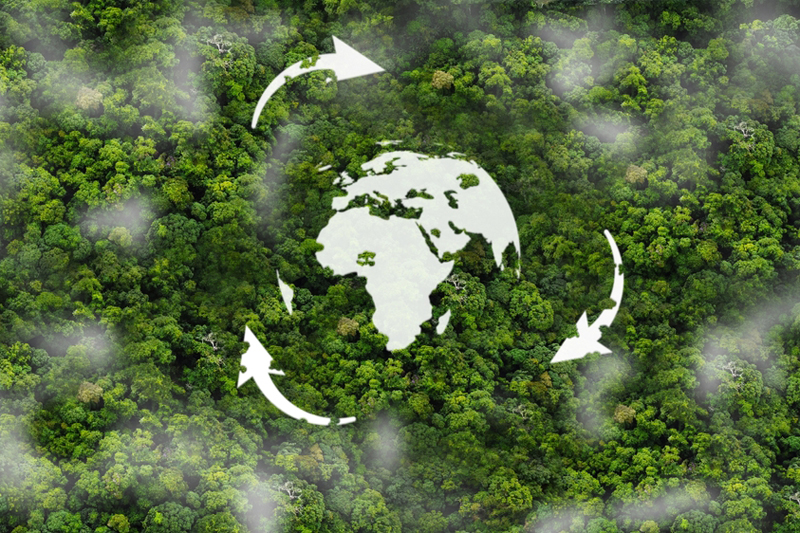 |
Environmentally sound management of wastes, and its responsible trade, is essential in mitigating climate change and promoting a circular economy. The waste management sector can play a vital role in climate mitigation through a multitude of actions.
Side Event: International regulations and national policies driving low carbon waste management and circularity
 3 December 2023
09:00 a.m.–10:30 a.m.
Waste and Resources Pavilion
Dubai, United Arab Emirates
Environmentally sound management of wastes, and its responsible trade, is essential in mitigating climate change and promoting a circular economy. The waste management sector can play a vital role in climate mitigation through a multitude of actions. First, through direct GHG reductions from solid waste management and, second, indirectly through the effects of waste prevention, re-use and recycling. Waste recycling and resource recovery – which are at the core of a circular economy - offer potential GHG reductions in the magnitude of up to 20% of the global emissions. The side event will explore the role of international regulations and national actions in driving waste management and circular economies in order to respond to the climate crisis.
Programme 
Moderator:
- Ms. Corinne Trommsdorff, Executive Director, French Solid Waste Partnership
Panelists:
- H.E. Dr. Kao Kim Hourn, Secretary-General of the Association of Southeast Asian Nations (ASEAN)
- Ms. Ghada Waly, Executive Director, the United Nations Office on Drugs and Crime (UNODC )
“Global actions to combat waste crime and illegal trafficking in waste”
- Mr. Rolph Payet, Executive Secretary, Basel, Rotterdam and Stockholm Conventions (BRS Conventions)
“The role of the Basel Convention in turning waste into resources and combating climate change”
- Mr. Neil Khor, Special Advisor to the Executive Director, United Nations Human Settlements Programme (UN-Habitat)
“Overview of the contribution of solid waste management to climate change, including major challenges in developing countries”
- Ms. Pia Tanskanen, Head of Environment, Nokia
“Private sector engagement to meet global environmental commitments on waste management, circularity and climate change”
- Mr. Roland Marion, Director of Circular Economy, French Agency for Ecological Transition (ADEME)
“Success factors that allow circularity in value chains”
- Mr. Carlos Silva Filho, President, International Solid Waste Association (ISWA)
Photo gallery

Organizers
|
|

|
|
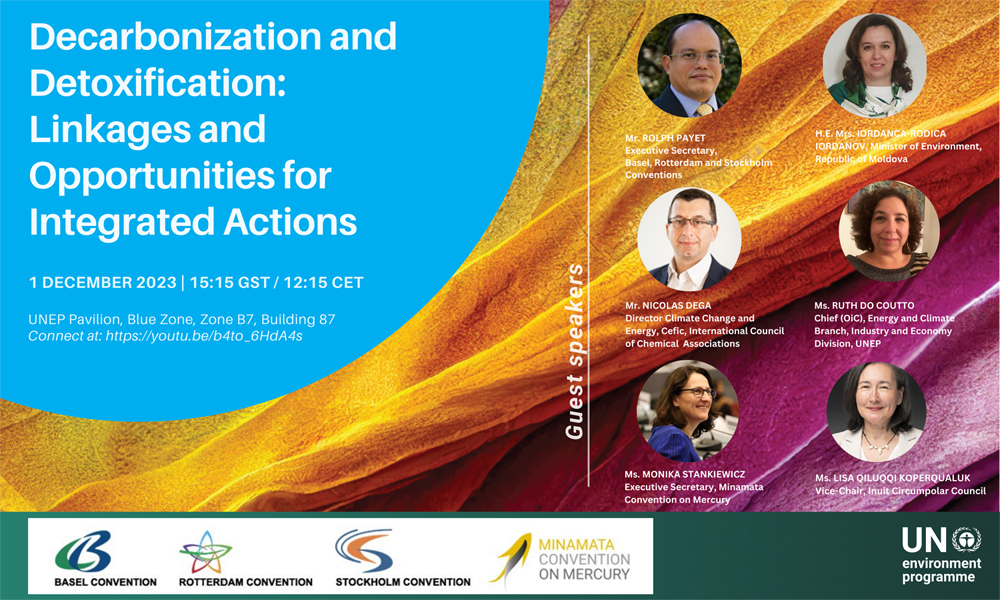 |
Chemicals are integral to almost all areas of society and are used across all economic sectors. The chemicals sector is the largest industrial energy consumer and the third largest industry subsector in terms of direct CO2 emissions.
Side Event: Decarbonization and Detoxification: Linkages and Opportunities for Integrated Actions
 1 December 2023
15:15-16:00 (UTC+4)
UNEP Pavilion, Blue Zone, Zone B7, Building 87
Dubai, United Arab Emirates
Chemicals are integral to almost all areas of society and are used across all economic sectors. The chemicals sector is the largest industrial energy consumer and the third largest industry subsector in terms of direct CO2 emissions. Many chemicals that are produced and utilized can have impacts on the environment and climate, with climate change in turn increasing the toxicity of some chemicals and amplifying their releases into the environment. There is growing evidence of the many varied interconnections between climate change and chemical production and use. Yet chemicals are often overlooked in climate discussions, and vice versa.
This side event aims at:
- Enhancing the understanding of the pernicious and complex interactions between climate change and chemical pollution;
- Identifying opportunities for synergistic actions that have benefits to address both the climate and pollution environmental crises;
- Calling for a better recognition of the chemicals-climate link in the global climate governance and policies.
Programme
Opening and setting the scene:
- Mr. Rolph Payet, Executive Secretary, Basel, Rotterdam and Stockholm Conventions
Panel discussion
- Mrs. Iordanca-Rodica Iordanov, Minister of Environment, Republic of Moldova
- Mr. Nicola Rega, Executive Director Climate Change and Energy of the European Chemical Industry Council (CEFIC), International Council of Chemical Associations (ICCA)
- Ms. Ruth Do Coutto, OiC, Chief, Energy and Climate Branch, Industry and Economy Division, United Nations Environment Programme (UNEP)
- Ms. Lisa Qiluqqi Koperqualuk, Vice-Chair, Inuit Circumpolar Council (ICC)
Q&A
Closing
- Ms. Monika Stankiewicz, Executive Secretary of the Minamata Convention on Mercury
Resources
| Presentation |
|
Webcast recording
|
|
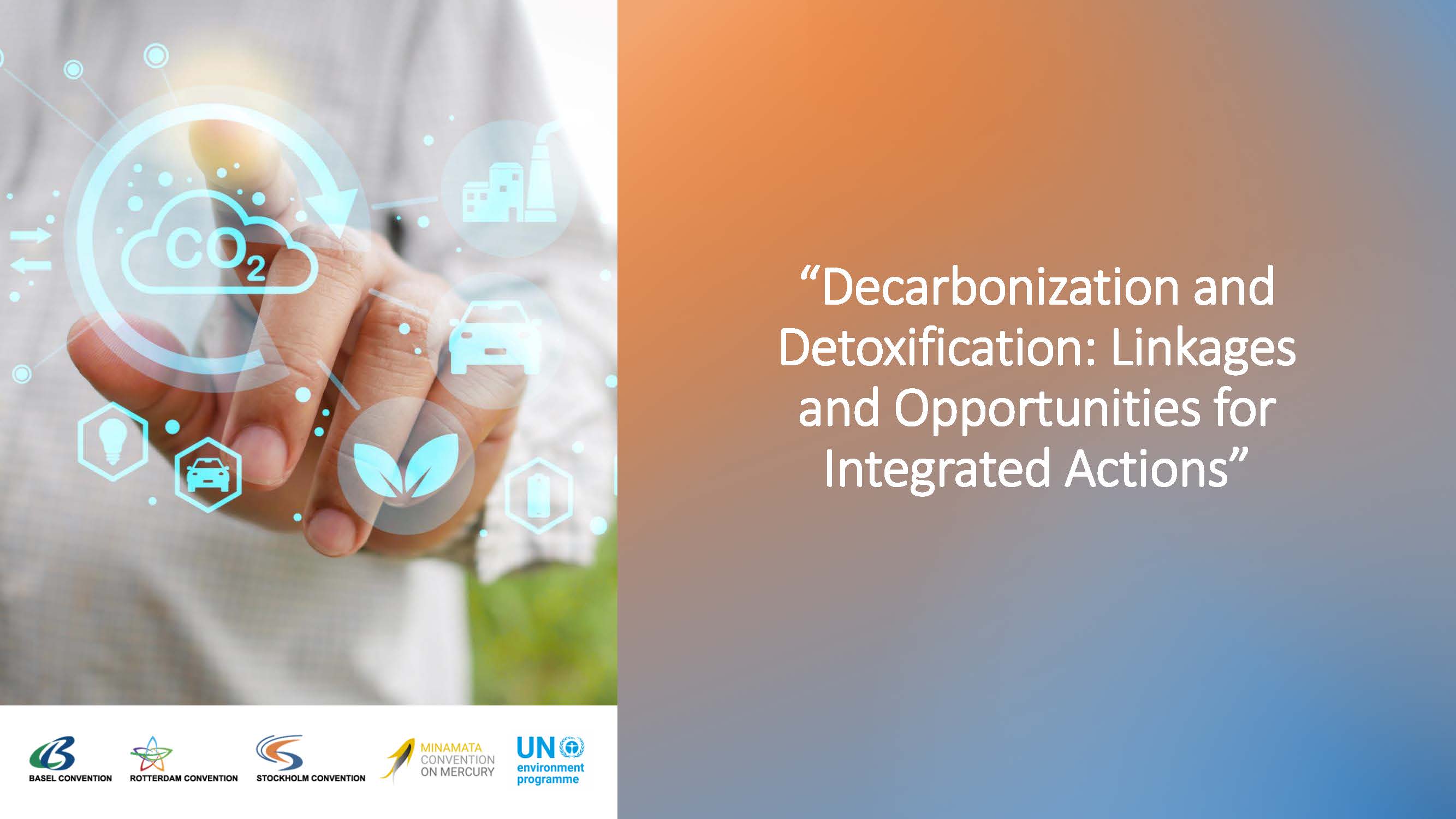 |
|
|
|
Photo gallery
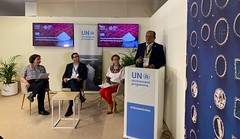
Organizers
|
|

|
|